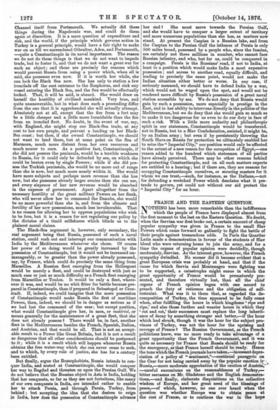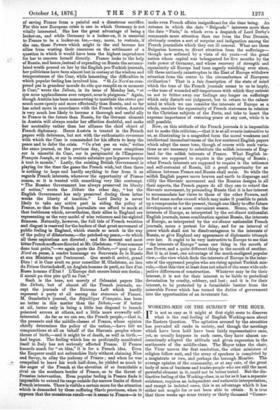FRANCE AND THE EASTERN QUESTION.
NOTHING has been more remarkable than the indifference which the people of France have displayed almost from the first moment to the last on the Eastern Question. No doubt, when the Servian war first broke out, a certain amount of cheap popular sympathy was given in France to the small Slav Powers which came forward so gallantly to fight the battle of their people against tremendous odds. In Paris the Quartier Latin made a demonstration in favour of the students of Slav blood who were returning home to join the army, and for a time the organs of popular opinion were decidedly, though moderately, Servian. As the interest grew, however, the French sympathy dwindled. No sooner did it become evident that a great European crisis was probably at hand, and that if the cause for which Beryls. and Montenegro were fighting was to be supported, a catastrophe might ensue in which the great opportunity of France would be prematurely pre- sented, and therefore virtually lost, than all the chief organs of French opinion began with one accord to preach the duty of reticence and the obligation of self- restraint. Mat was it to them that, as regarded the de- composition of Turkey, the time appeared to be fully come when, after fulfilling the hours in which kingdoms 'ripe and ripe,' and also those further and wearier hours in which they rot and rot,' their successors must replace the long inherit- ance of decay by something stronger and better,—if the hour which had struck, though it was the hour for the subject pro- vinces of Turkey, was not the hour for the uprising and revenge of France ? The Russian Government, as the French politicians knew, was no more ready to take advantage of a great opportunity than the French Government, and it was quite as necessary for France that Russia should be ready for the emergency, as that France herself should be ready. Hence the tone which the French journals have taken,—incessant depre- ciation of a policy of "sentiment,"—continual panegyric on the Czar for not being carried away by the popular emotion irs• Russia,—more moderate approbation of the caution of Austria, —careful encomiums on the reasonableness of Turkey,— bitter sarcasms on Mr. Gladstone and the English demonstra- tions,—and finally, elaborate disquisitions on the collective wisdom of Europe, and her great need of the blessings of peace,—of which, however, no one ever heard when the question was whether Europe was to obtain peace at the cost of Franc*, or to continue the war in the hope of saving France from a painful and a disastrous sacrifice. For this new European crisis is one in which Germany is not vitally interested. She has the great advantage of being a looker-on, and while Germany is a looker-on, it is essential to France to be a looker-on too,—nay, more, to restrain, if she can, those Powers which might in the end become her allies from wasting their resources on the settlement of a question in which it would have been the highest imprudence for her to concern herself directly. France looks to the help of Russia, and hence, instead of expending on Russia the accumu- lated wrath poured on her by the English pro-Turkish journals, her politicians have been almost lost in ecstasy at the wisdom and temperateness of the Czar, while lamenting the difficulties in which popular feeling has involved him. "Si Le Nord ne com- prend pas la grandeur morale du role que remplit en ce moment le Czar," wrote the Debate, in its issue of Monday last, "et que nous applaudissons avec respect, nous le plaignons." Again, though Austria has been manceuvring to maintain the status quo much more openly and more effectually than Russia, and so far has acted more in accordance with the French wishes, Austria is very much less likely to become a thorough and useful ally to France in the future than Russia, for the German element in Austria will always render her affinities doubtful, and make her neutrality rather than her alliance the chief object of French diplomacy. Hence Austria is treated in the French papers with deference, but not with the enthusiastic reverence with which the Czar is commended for his efforts to keep the peace and to defer the crisis. " Ce n'est pas en vain," writes the same journal, on the previous day, "quo nous comptions sur la sincerite du Czar, sur la perspicacite de l'Empereur Francois Joseph, et sur la crainte salutaire que la guerre inspire a tout le monde." Lastly, the existing British Government is playing for the time the game the French wish, but then there is nothing to hope and hardly anything to fear from it as regards French interests, whenever the opportunity of France comes, so it is treated with something very like contempt. "The Russian Government has always preserved its liberty of action," wrote the Debate the other day, "but the English Government has only preserved during these latter weeks the liberty of inaction." Lord Derby is never likely to take any active part in aiding the policy of France, so that the French journalists can afford to mock at that feebleness which, nevertheless, their allies in England are representing as the very model of wise reticence and far-sighted firmness. Naturally, however, the full tide of French vexation and disgust is reserved for the leaders of that great movement of public feeling in England, which stands so much in the way of the policy of dilatoriness,—the patched-up peace,—to which all these aspirations are directed ; and the keenest and most bitter French scoffs are directed at Mr. Gladstone. " Nous sommes done tout prets,"—we again quote the Dibats,—"quoi que Le Nord en pease, h rendre hommage au Souverain de la Russie et au.x Miniatres qui l'entourent. Quo serait-il arrive, grand Dieu I si le Czar avait en pour col:miller M. Gladstone, au lieu du. Prince Gortschakoff, an Anglais homme de parti, au lieu d'un Russo homme d'Etat ? L'Europe dolt encore hair son destin ; il aurait pu etre pire qu'il ne fest."
•
Such is the tone, not merely of Orleanist papers like the Debate, but of almost all the French journals, ex- cept the journals of the Extreme Left which hardly represent a party at all among the statesmen of France. M. Gambetta's journal, the Re'publique Frangaise, has been no better in this matter than the Dibats,—or if better at all, better only in being a little less disposed to launch poisoned arrows at others, and a little more avowedly self- interested. As far. as we can see, the French people,—that is, the peasants and the middle-classes of France, whose opinion chiefly determines the policy of the nation,—have felt no compunctions at all on behalf of the Slavonic peoples whose throes of bizth,—and it might be of death, as well as birth,— had began. The feeling which has so profoundly manifested itself in Italy has not seriously affected France. If France hazards much for "an idea," it is for a French idea. Even the Emperor could not enfranchise Italy without claiming Nice and Savoy, to allay the jealousy of France ; and when he was compelled to leave his work half-done, he yielded as much to the anger of the French at the elevation of so formidable a rival on the southern border of France, as to the threat of Prussian intervention. Even popular feeling in France finds it impossible to extend its range outside the narrow limits of direct French interests. There is visible a certain scorn for the attention which is demanded by these suffering Slavic provinces, when it appears that the monstrous result--so it seems to France—is to make even French affairs insignificant for the time being. An autumn in which the date " Belgrade " interests more than the date "Paris," in which even a despatch of Lord Derby's commands more attention than one from the Duo Decazes, obviously creates a sort of surprise and indignation among the French journalists which they can ill conceal. What are these Bulgarian horrors, to divert attention from the sufferings— though now softened by a vista of six years—of the great nation whose capital was beleaguered for five months by the rude power of Germany, and whose recovery of strength and equanimity all Europe had been eagerly watching ever since, till these untimely catastrophes in the East of Europe withdrew attention from the centre to the circumference of European civilisation? That is a fair description of the state of mind which the tone of the French journals seems to us to imply, —the tone of wounded self-importance with which they entreat us not to fritter away our feelings any longer on sufferings which only disturb our judgment, but to return to the calmer mind in which we can consider the interests of Europe as a whole, emulate the equanimity of French statesmen in relation to the Christian subjects of the Porte, and take to heart the supreme importance of restoring peace at any cost, while it is still possible.
Now, on this attitude of the French journals it is impossible not to make this criticism,—that it is at all events instructive to us, as illustrating in a magnified form the moral weakness and intellectual inconclusiveness of the few scattered English papers which adopt the same tone, though of course with such varia- tions as are necessary to substitute the selfish interests of Eng- land for the selfish interests of France. What English in- terests are supposed to require is the paralysing of Russia ; what French interests are supposed to require is the reticence and self-restraint of Russia, till a great opportunity for an affiance between France and Russia shall occur. So while the selfish English papers move heaven and earth to disparage and vilify the Slavonic movement and the Russian designs in all their aspects, the French papers do all they can to retard the Slavonic movement, by persuading Russia that it is her interest to accommodate her views to those of the other Powers, and to find some modus vivendi which may make it possible to patch up a compromise for the present, though one likely to offer future developments at a more convenient season. Hence, while the interests of Europe, as interpreted by the soi-disant nationalist English journals, mean combination against Russia, the interests of Europe, as interpreted by the soi-disant nationalist French journals, mean a pretext for delay, and for an interval of peace which shall not be disadvantageous to the interests of Russia, or give England any appearance of diplomatic triumph over her. It ought to be very instructive to Europe to see that "the interests of Europe" mean one thing in the mouth of one Power, and a quite different thing in the mouth of another. But it is, at least, one advantage of the much-maligned popular view,—the view which finds the interests of Europe in the inter- ests of the oppressed peoples who are rising against Turkish mis- rule,—that this view at least does not admit of the same wide sub- jective differences of construction. Whatever may be for their interest, it is not for their interest to be liable to periodical devastation by cruelty, robbery, and lust ; and it is for their interest, to be protected by a formidable barrier from the miserable Power which has turned the duties of government into the opportunities of an inveterate foe.



































 Previous page
Previous page